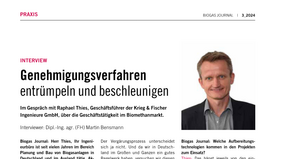In an interview with Raphael Thies, Managing Director of Krieg & Fischer Ingenieure GmbH, Biogas Journal spotlights the growing demand for biomethane plants in issue 3_2024. Raphael Thies, an expert in the field of biogas technology, shares his insights into current developments and challenges in the industry.
International demand and technical differences
Customers for biomethane plants mainly come from Germany, Poland and the USA. In Germany and Poland, the plants reach impressive industrial sizes of up to 45 megawatts. In the USA, both agricultural plants and a large industrial plant for the fermentation of thin stillage from alcohol production with over 35 MW are operated. The technology for these projects is largely sourced from Germany, as Europe, and Germany in particular, is a leader in biogas technology.
The projects in the USA and Germany differ primarily in terms of national legislation and technical characteristics. While two biomethane plants are under construction in the USA and five more are due to start this year, three biogas upgrading plants are planned in Germany for 2024. In addition, three large-scale plants with a total biogas output of around 120 MW are in the planning phase for 2025 to 2026.
Wide range of processing technologies
The treatment technologies vary depending on the project. Membrane systems, amine scrubbing and pressure swing adsorption are currently being planned. The upgraded biogas is usually fed into the natural gas grid, in the USA partly also via virtual grids.
Challenges and opportunities
Approval procedures are described as increasingly complex and lengthy, partly due to the complexity of the plants. Differing requirements in the federal states further complicate the processes.
Despite a shortage of skilled workers and a difficult applicant market situation, the increased demand for projects has led to an increase in the number of employees. New employees appreciate the attractiveness of “renewables” and the opportunity to actively participate in climate protection.
Outlook and demands
In conclusion, Raphael Thies emphasizes the need for planning security and reliable framework conditions for investments in biomethane plants. He calls for a clear commitment to bioenergy and the promotion of renewable energy sources in order to ensure competitiveness with fossil fuels.
This interview shows that the biogas sector is facing exciting challenges, but also offers great potential for sustainable energy production.



